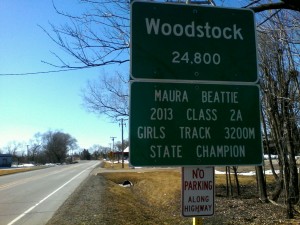Woodstock aims for home rule through special census
Gregory Harutunian — March 16, 2015 Woodstock is laying the groundwork for a special census, hoping to meet the population threshold for designation as a home rule community. City officials view the move as a progressive step in being able to chart their own authority.
Woodstock is laying the groundwork for a special census, hoping to meet the population threshold for designation as a home rule community. City officials view the move as a progressive step in being able to chart their own authority.
By law, Illinois municipalities with populations of 25,000 or more, receive a home rule status that creates a local taxing authority and removes ties to state-mandated limitations regarding additional assessments. This includes various retailer’s occupation (sales) taxes, utilities, and property sales. It also allows an exemption on the annual levy amount above the property tax cap of 5 percent, or the fixed rate of inflation.
The prospect of state cuts to the local government distributive fund (LGDF), which would leave an approximate $1.2 million shortfall in the city’s fiscal year 2016 budget, has also been raised as driving consideration for the home rule pursuit. The city council must also conclude its budget discussions in the coming weeks.
“Our fiscal year runs from April 1 through March 31, while the state legislature’s budget begins July 1, but they could extend their deadline,” said Roscoe Stelford, Woodstock’s city manager. “We need to have it in place, though, and if the gap is there, we’ll have to address cuts.
“By spring 2016, when the census takes place, everything will be on the table at the state and local level. The picture will be clear on cuts, revenues, and what adjustments are required.”
The cost for the special census is being tabbed at $120,000. That total is slated for two equal $60,000 set-aside disbursements as line items in the current budget, and another one in the subsequent fiscal year. It will be administered through the U.S. Census Bureau, which last conducted the survey in 2010 and fixed Woodstock’s population at approximately 24,800.
“This is not simply a tool for more taxes, and not the prime purpose,” said Stelford. “It gives us the opportunity to invoke more creative solutions to community problems such as initiating programs without the bridles imposed on a non-home rule community. As a recent example, citizens raised concerns over rental properties being in compliance with codes, and basic living conditions.
“It’s something that property owners were requested to do voluntarily,” he said. “In a home-rule situation, a landlord program can be established for all to comply with. We can implement properly on a local level, which local government should do.”
Census workers are expected to be contracted in the spring of 2016, and make contacts with residents through the following year. An anticipated increase over the population threshold would eventually translate to more opportunities at the state level for funding considerations, such as the revenue-sharing LGDF amount.
“From an economic standpoint, home rule gives us a wider pallet to work with, and makes us more attractive to businesses,” said Cort Carlson, the Woodstock economic development director. “Having that authority to address issues that impact our community more readily and more effectively is a definite advantage.”







